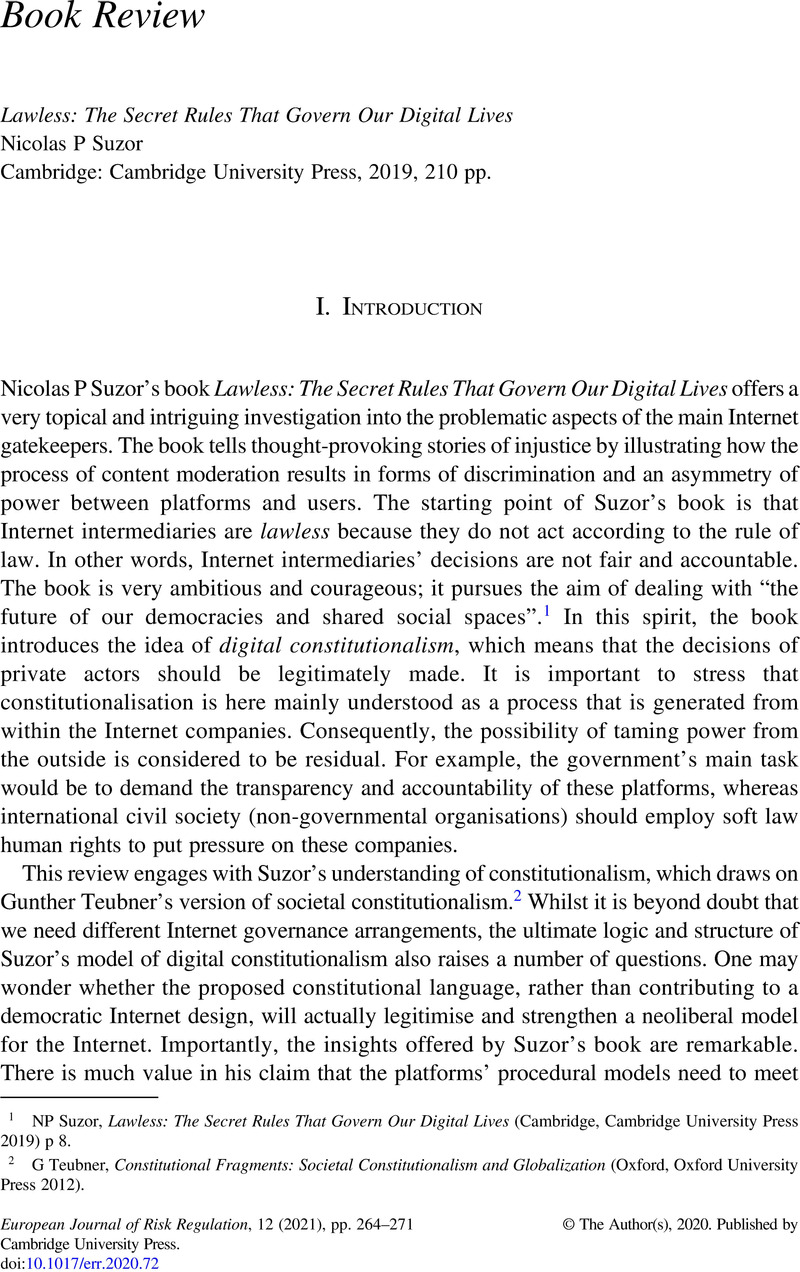Published online by Cambridge University Press: 05 November 2020

The author would like to acknowledge the support of two Academy of Finland research projects: “Is This Public or Private? – A Study of the Philosophical Foundations of European Privacy Regulation” (Decision No. 321995); and “The Potential and Boundaries of Algorithmic Transparency” (Decision No. 324116).
1 Suzor, NP, Lawless: The Secret Rules That Govern Our Digital Lives (Cambridge, Cambridge University Press 2019) p 8CrossRefGoogle Scholar.
2 G Teubner, Constitutional Fragments: Societal Constitutionalism and Globalization (Oxford, Oxford University Press 2012).
3 See, eg, A Febbrajo, “Constitutionalism and Legal Pluralism” in A Febbrajo and G Corsi (eds), Sociology of Constitutions: A Paradoxical Perspective (Abingdon, Routledge 2016) pp 94–131.
4 H Micklitz, “Rethinking the Public/Private Divide” in MP Maduro, K Tuori and S Sankari (eds), Transnational Law: Rethinking European Law and Legal Thinking (Cambridge, Cambridge University Press 2014) pp 271–306.
5 The author also refers to Teubner on p 123.
6 E Christodoulidis, “On the Politics of Societal Constitutionalism” (2013) 20 Indiana Journal of Global Legal Studies 629, Article 5; M Neves and K Mundy, Transconstitutionalism (Oxford, Hart Publishing 2013). My comments are inspired by these two authors; GC Guimarães, Global Technology and Legal Theory: Transnational Constitutionalism, Google and the European Union (Abingdon, Routledge 2019) p 29.
7 Suzor, supra, note 1, p 165.
8 ibid, p 114.
9 ibid.
10 J Cohen, Between Truth and Power: The Legal Constructions of Informational Capitalism (Oxford, Oxford University Press 2019) p 1.
11 Suzor, supra, note 1, p 121.
12 ibid, p 111.
13 S Zuboff, The Age of Surveillance Capitalism: The Fight for a Human Future at the New Frontier of Power (London, Profile Books 2019).
14 Suzor, supra, note 1, p 134.
15 For similar remarks, although developed in a different context, see K Creutz, “Law versus Codes of Conduct: Between Convergence and Conflict” in J Klabbers and T Piiparinen (eds), Normative Pluralism and International Law: Exploring Global Governance (Cambridge, Cambridge University Press 2013) pp 166–200.
16 See also Suzor, supra, note 1.
17 See Neves and Mundy, supra, note 6, p 18.
18 Transparency here is quite well discussed; see Suzor, supra, note 1, pp 136–41.
19 C Bratschi, “Transnational Law beyond Bi-polarity: The FSB Key Attributes of Effective Resolution Regimes for Financial Institutions in National, European and Transnational Law” (PhD thesis, European University Institute, Department of Law 2015).
20 Christodoulidis, supra, note 6.
21 I have borrowed the term “managerialism” from Koskenniemi, who, when discussing international law, argues that a “managerial mindset assumes the absolute determinacy of the directives it uses to attain regime-objectives, which must be not only semantically determinate but must also form a stable and harmonious whole, immediately translatable into policy for future cases”. M Koskenniemi, “Constitutionalism as Mindset: Reflections on Kantian Themes about International Law and Globalization” (2007) 8 Theoretical Inquiries in Law 9, 16.